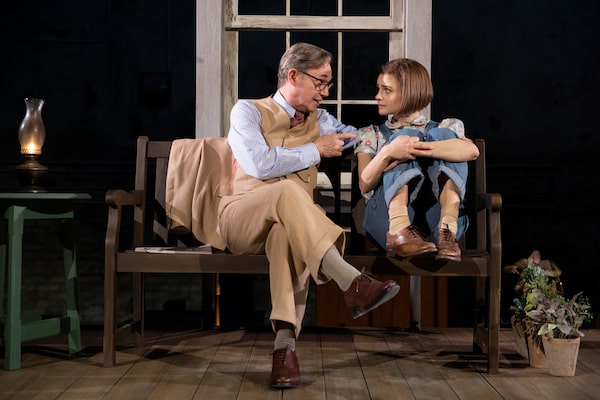
Richard Thomas (Atticus Finch) and Melanie Moore (Scout Finch) in a scene from To Kill a Mockingbird at CAA Ed Mirvish Theatre.Julieta Cervantes/Supplied
- Title: Harper Lee’s To Kill a Mockingbird
- Written by: Aaron Sorkin
- Director: Bartlett Sher
- Actors: Richard Thomas
- Company: Mirvish Productions
- Venue: CAA Ed Mirvish Theatre
- City: Toronto
- Year: Runs to November 27; then May 28 to June 2, 2024
To Kill a Mockingbird, now on tour at the CAA Ed Mirvish Theatre in a handsome big-budget Broadway production directed by Bartlett Sher, is a rare bird, indeed.
While successful Broadway musicals still hit the road as a rule, popular Broadway plays hardly ever do any more because of insufficient demand.
In fact, I believe celebrity screenwriter Aaron Sorkin’s 2018 adaptation of Harper Lee’s classic American novel is the first new stage drama to come to the city in a touring version of its Great White Way production since Tracy Letts’s August: Osage County back in 2009.
The hit show’s upending of 21st century theatrical economics is primarily a testament to the enduring, widespread fondness for Lee’s 1960 book, in which she looked back at her childhood immersed in the white supremacy of 1930s Alabama.
Or, at least, to how long that novel has remained a part of high-school English classes all across North America, despite long-standing curriculum challenges from the right and increasing ones from the left.
To Kill a Mockingbird, for those of you (like me) who were assigned John Steinbeck instead in Grade 8, concerns the Depression-era trial of Tom Robinson, a Black man falsely accused of rape of a young poor white woman named Mayella in Maycomb, Ala.
But it is told through the eyes of a white girl named Scout, the daughter of an awfully upright lawyer named Atticus Finch. He defends Tom despite threats from Mayella’s abusive father Bob and the local Klan chapter.
The fact that To Kill a Mockingbird tells a tale of racist persecution from Scout’s adjacent perspective forms the basis of contemporary critiques of it today – as does Finch’s supposed status as “white saviour” in Lee’s narrative.
The strongest aspect of Sorkin’s fresh, though by no means fashionable, adaptation of the material is how it pokes holes in Finch’s reputation as such, mostly by accentuating parts of Lee’s story that the old stage adaptation by Christopher Sergel (seen at the Stratford Festival in 2018) did not.
Indeed, Richard Thomas, known to millions of Baby Boomers for playing John-Boy on The Waltons (but, to me, for his appearances on prestige TV dramas such as The Americans and Ozark), plays Finch in a way that will alienate those who want to see the character solely as a hero.
His initially wise-seeming saws about shared humanity are delivered in a smug and superior way, his slow Southern drawl often coming off as condescending.
It took me a while to realize that Thomas’s portrayal was a little irritating on purpose, and dramatically useful in highlighting the chief point Sorkin wants to make: That Finch is a classic tragic figure brought down by his hubris.
His fatal flaw is his belief in the fundamental goodness of his neighbours and his inability to see the reality of their hatred until – spoiler alert – it costs a Black man his life. And then, as soon as this reality threatens his own children, he’s happy to compromise his moral positions and interfere with justice running its proper course.
I hesitated to add in that spoiler alert because, in Sorkin’s adaptation, Scout (Melanie Moore) begins the play by mulling over Finch’s actions at the end of the novel and reconsidering his reputation as the most decent man in Maycomb.
She’s one of three narrators, the other two being her brother Jem (Justin Mark, deliciously deadpan) and friend Dill (Steven Lee Johnson, giving the most emotionally moving performance). While their badinage is entertaining and moves the plot along, the framing device involving them doesn’t make a ton of sense if you look at it too closely.
In truth, though the children narrate, Sorkin seems not all that invested in them – their youthful games, their fear of mysterious neighbour Boo Radley, or even their loss of innocence.
Chiefly, Sorkin is turned on theatrically by the courtroom drama aspect of To Kill a Mockingbird, which makes sense given he first rose to fame with the play, then the movie, A Few Good Men. (After which came TV and films such as The West Wing and Moneyball.)
He throws the audience right into the thick of it with one of Finch’s feisty cross-examinations to kick off the show. His courtrooms scenes are just swell – as is one where Scout confronts the Klan, and all of Finch’s private conversations with a passive-aggressive Calpurnia (Jacqueline Williams), the family maid whose lived experience clashes with his idealism.
Much has been made of Sorkin’s expanding the parts of Calpurnia and Tom (Yaegel T. Welch), but they’re ultimately still supporting parts, a sounding board or a symbol of noble suffering.
It’s probably best to simply accept that To Kill a Mockingbird is primarily about white people wrestling with and waking up to white supremacy and not whatever story people would rather it be. And then go and seek other stories, such as Calpurnia, Canadian playwright Audrey Dwyer’s dinner party drama about a Black screenwriter trying to pen a film about the Finch family maid. It’d be great to see the revised version back in Toronto one of these days.